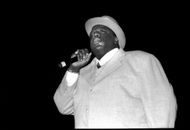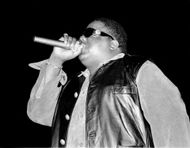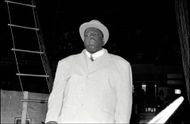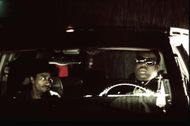Notorious B.I.G., also known as Christopher Wallace, left behind a legacy that continues to echo through hip-hop and the world in general. Rather than simply recording pop-sounding singles, Biggie used his tracks as a painting of sorts, using them as a canvas for storytelling in the broadest sense, writing living pictures of urban existence, personal struggle, and survival against adversity using descriptive detail.
His ability the blend raw reality and brazen bravado put him as the undisputed voice of rap, walking the tightrope between clever phraseology and silky flow. More than simply a rapper, he was a chronicler of his own universe, breaking down each line and turning it into a film. Dozens of years have passed since he passed away, but to this day, his presence remains unshaken in the realm of music.
From Bed-Stuy pillars to the world's biggest stages, The Notorious B.I.G.'s career is not simply based in hip hop, it's its pillar. Chronicler of more than just an MC, Biggie wrestled out the savage realities of his world and crafted them into poetic lyrics, building vivid scenes of living, lust, and living on double-edged streets.
His skill in painting these portraits with lyric subtlety and charm made his albums like Juicy, Hypnotize, Gimme the Loot, and Kick in the Door cultural benchmarks. But his albums were neither bluster nor bravado.
Beneath the glow of his crossover success, tracks like Everyday Struggle and Things Done Changed were regarded as reflections, windows to the psychic tension of his rise and the world's change around him.
He made his stories resonate far past the city of New York and left a blueprint for susceptibility and swagging to coexist in hip hop.
Disclaimer: This article contains the writer's opinion. Reader's discretion is advised!
Here are the top 8 Notorious B.I.G. tracks you can't forget
These are the best 8 Notorious B.I.G. songs you can't help but remember, not due to name familiarity only, but because each one symbolizes a new dimension of his work. Some thump with swagger and cockiness, brimming with larger-than-life swagger that made him a global phenomenon. Others descend into the darkness of his journey, reliving the fear, uncertainty, and internal conflict that accompanied his ascendancy.
There are the songs where he's the suave-talking ladies' man, smoothly demanding attention, and others where he lifts the veil to show the toll he paid behind the glory. These songs represent the complete range of Biggie's narrative, gritty, glamorous, exposed, and unafraid to be real, behind his enduring legacy decades on.
1) Juicy
Juicy is more than a pillar of The Notorious B.I.G.'s oeuvre, more than a cultural manifesto that hides behind the gilded surface of a '90s hip-hop hit. Its gilded surface shines with success and braggadocio, but underneath is a highly autobiographical account of struggle, drive, and rebirth.
Biggie doesn't merely speak of how he emerged from Brooklyn's depths of poverty to the rap stratosphere, but he remakes the rules of what talent and unbreakable will can do.
On the soulful background of Mtume's Juicy Fruit, the song gallops with both thanks and strength, siphoning off fervent memories of struggle into victory cheers. His own testimony is autobiography and inspiration, not a mere euphoric celebration of success or money, but an attestation of the journey it was that arrived there.
Juicy is therefore an anthem for all people who have ever envisioned bigger than their realities, transforming one man's tale to a generation's voice of hope.
Read More: 10 famous songs you didn’t know were originally written for someone else
2) Notorious Thugs
Notorious Thugs is a testament to The Notorious B.I.G.’s chameleon-like nature, with Biggie leaving his bubble of East Coast identification behind to work with Cleveland's Bone Thugs-N-Harmony. Instead of token cameo verses on the single, Biggie seamlessly integrates Bone Thugs' double- and triple-time flows into his own, adapting his own delivery perfectly to the melodic timing without ever sacrificing lyricity or his usual cool.

Much of the beauty of the track isn't in the surprise of the blending, but in the way that the two differing styles merge so seamlessly, East Coast gruff-grit yap giving way to Midwestern nice. Rather than taking over the song, Biggie invites Bone Thugs into his domain, and cedes and yields control with ease.
The record is not simply of a meeting of flows; it's of cultural exchange of hip-hop centers in a period of unparalleled convergence. Notorious Thugs bears testimony to Biggie's talent for diversifying, but that he was able to dominate wherever he wanted, making stylistic challenge the playground for lyrics.
Read More: 10 famous rap beefs that shook the hip-hop world
3) Who Shot Ya?
Released during a period of upheaval in hip-hop history, Who Shot Ya? was almost immediately one of The Notorious B.I.G.'s most hotly debated records, not because of the boisterous lyrics so much as because of the storm around the controversy surrounding it. Biggie himself attested that there was no mention of the 1994 shooting of Tupac Shakur, but listeners interpreted it as a backhanded mocking, a further spark to the fire of East Coast–West Coast rivalry.
But apart from the controversy, what makes the track stand out is Biggie's smooth flow over a ghoulish, bassline-dominated beat with an air of menace and cool detachment. It's a bravado-driven cut that's packed with lyrical information, with his eerie ability to blend storytelling and street poetry.
Years on, Who Shot Ya? still stands as a signature moment in Biggie's legacy, not just for what it meant culturally, but for the acutely drawn skill that set him in cemented position among hip-hop's all-time greats.
Read More: 8 Tate McRae songs you need on repeat
4) Kick in the Door
Kick in the Door ranks among The Notorious B.I.G.'s best lyrical work, displaying not only his whip-fast wordplay but also his capacity to couple menace with effortless cool. In place of merely riding over the beat, Biggie warps it to his advantage, exchanging barbed verses loaded with subliminal shade on his rivals within the rap field.

DJ Premier's gravel-toned beat is the canvas, constructed from a looped piano sample of Screamin' Jay Hawkins' I Put a Spell on You, and it gives the track an unsettling, near-spectacular feel. It's not only the angry energy of the song that makes this track iconic, however, it's the way Biggie takes that aggression and does something special with it, turns a diss record into a lyric clinic.
Over time, Kick in the Door was more than a threat to rivals; it's a blunt reminder of Biggie's supremacy at a time when each bar had the potential to tip the scales of hip-hop supremacy.
Read More: Top 10 Doja Cat songs you can’t stop vibing to
5) Suicidal Thoughts
Among the most unsettling experiences in The Notorious B.I.G.'s catalog, Suicidal Thoughts closes out Ready to Die not on triumph or closure, but a graphic drop into despair. The track comes in the form of an ersatz late-night phone call to Puff Daddy in which Biggie unravels before his guilt, self-loathing, and desire to escape through death.
But what's so unsettling about this song isn't so much the content; it's the delivery. Biggie spits like he's under oath. He's weary, fatalistic, and unnervingly even-keel, as if he's already resigned himself to what he's doing. The rhythm is subdued but menacing, a minimal backing that makes the emptiness in his voice sound all the more hollow, and Puffy's frantic objections just drive the point home of the act's irrevocability.

What sets Suicidal Thoughts apart from most of the self-reflection tracks in hip-hop is its complete refusal to moralize or sentimentalize. There is no salvation here, no last-minute turnaround or reassurance. Instead, Biggie offers a stark glimpse into a mind pushed to the brink of insanity, laying bare the mental burdens which fame, ghetto life, and internalized shame have placed upon him.
It's a creative risk few rappers have taken so fully: to lay open not just vulnerability but a full collapse of hope. In a genre partially defined by braggadocio, this song cuts through the posturing with bitter truth. It's not a song, it's an accounting, a final monologue from an artist who, for a moment, drops the façade of The Notorious B.I.G. and addresses us as Christopher Wallace.
The vulnerability here is not performativity; it's brutally real, which makes Suicidal Thoughts one of the most emotionally intense and psychologically honest hip-hop songs ever.
Read More: The evolution of BTS: Beyond the music, beyond the scene
6) Ten Crack Commandments
Ten Crack Commandments is a raw survival manifesto, rather than merely a song, but a street-accessed guide inscribed in rhyme. Instead of glamorizing the illegal drug business, The Notorious B.I.G. addresses the topic with the clarity of an experienced tactician, detailing ten hard-won precepts intended to make hustlers live, remain free, and be profitable.

Sung in a driving rhythm that sounds simultaneously desperate and contagious, Biggie's voice demands respect, combining macabre humor with brutal honesty. Every commandment is drawn from real life, told in the voice of a survivor who has seen the game's peaks and deadly pitfalls.
The thing that makes the song special is how it reimagines criminal guidelines as universal parables, speaking to generations long after its 1997 drop. It's not just rap; it's an ethic code from a world most only see through news headlines, relayed by someone who made it through long enough to create art out of it.
Read More: Top 10 'The Beatles' songs that still echo through time
7) Sky’s the Limit
Sky's the Limit is a more positive song by The Notorious B.I.G., balancing vulnerability and ambition in both personal and relatable terms. Rather than focus on violence or street life that has accounted for much of his earlier career, Biggie shifts to a more introspective posture on this song, telling the story of perseverance and belief.
Along with the help of 112's smooth harmonies, the song is a confirmation of his breakthrough to and a dirge over those who fashion their exits from desperation. The music is built richly and optimistically, with space for words which are a letter to himself at a younger age, optimistic, hopeful, and not wanting to be instructed by circumstance on what he should do next.
What prevents Sky's the Limit from aging is more uncooked sincerity, not the soulfulness of the song or its vulnerability to being made into a chorus. Not only is it an anthem for success, but a statement that success can be had, even when the odds are stacked against you.
On an album infamous for gritty realism, this track glows with Biggie's spare but passionate optimism, a moment when he sang for all the dreamers who were reaching beyond their times.
Read More: 8 Post Malone songs that defined a generation
8) Machine Gun Funk
Machine Gun Funk is as quintessential a case of The Notorious B.I.G.'s skill at taking grimy street stories and making them into effective musical moments as any. Instead of being merely plain ol' braggadocious or promoting the hustle, Biggie employs this song to draw a sympathetic picture of the psyche of a young adult struggling with the intricacies of survival, desire, and street cred.

The effortless-but-threat level track is building up to his razor-sharp lyrical flow, where each bar lands with intention and deliberateness. What truly makes the song great, however, isn't necessarily the beat or the posturing, but how Biggie evokes an environment through cadence and description, bringing personal experience to a universally engaging narrative.
Less a showcase of technical skill, Machine Gun Funk represents the initial spark of Biggie's imagination: coarse, introspective, and rhythmically compelling, a harbinger of the impact he would eventually have on East Coast hip-hop's sonic identity.
Read More: 10 Freddie Mercury tracks that still set the stage on fire
Through his discography, The Notorious B.I.G. consistently proved to be a greater rapper than ever; he was an album of descriptive storytelling, a voice of cadence, and a voice of a generation living life on the margins. His albums did not merely rest on top of the rhythm; they had substance, delivering unapologetic, often raw portraits of his life with a poetic flair few could hope to achieve. No matter delivering specter-like introspection or confident declarations, Biggie brought a mix of charm, vulnerability, and lyricism unusual in hip-hop that continues to resonate.
His records weren't just about the block, it was about longing, pain, survival, and the human experience, all conveyed in natural flow and quotable rhymes. Even after decades, his records are still the standard for hip-hop authenticity.
Keep reading SoapCentral for more informative content!
Also Read: 8 Ice Cube songs that show why he’s a legend
